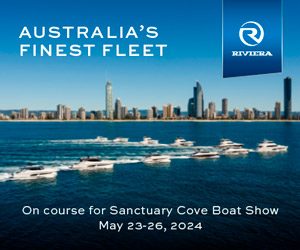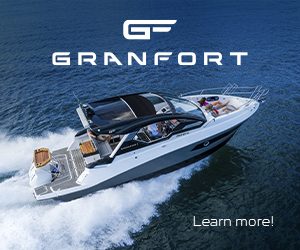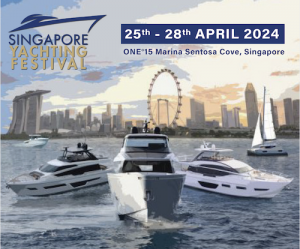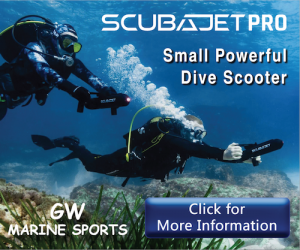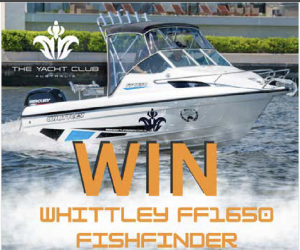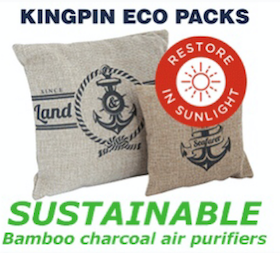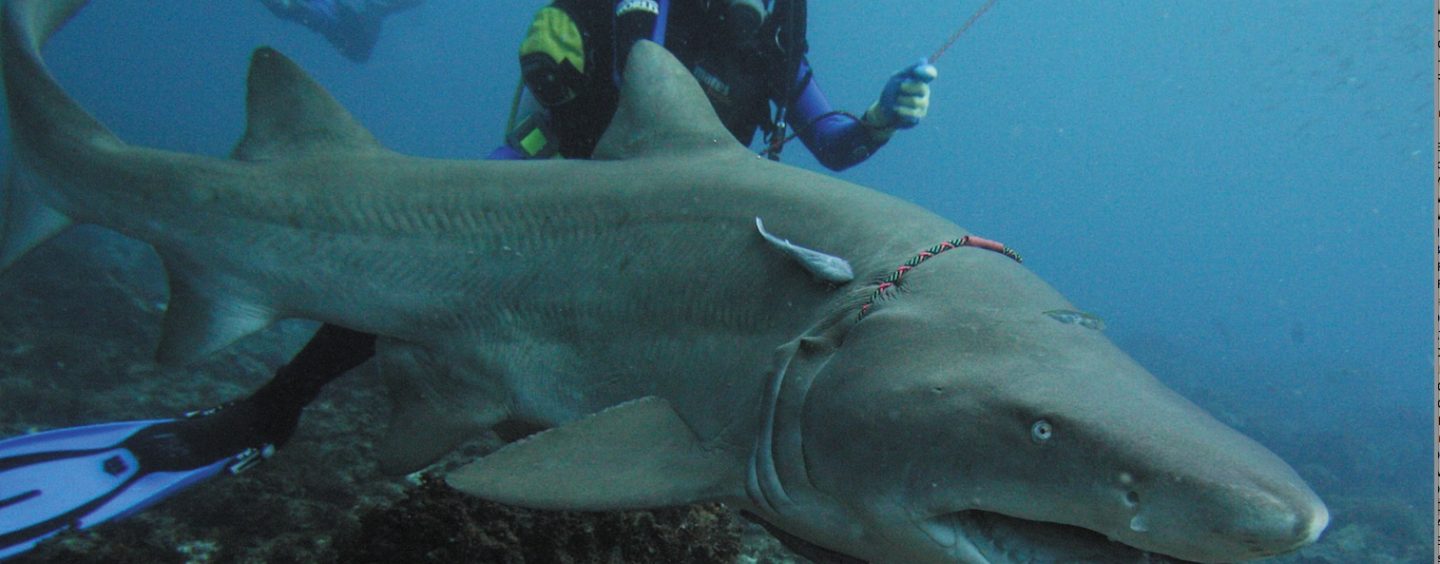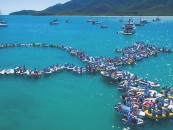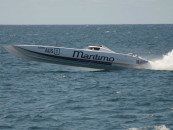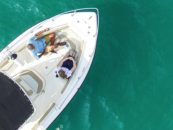With an average speed of just 12 knots an hour, the 57ft old girl is proud to have 7000 hours under her hull. It has been a transformative 30 or so years in and around Moreton Bay since her time as a West Coast trawler. Now she feels as if she is living her true purpose – transporting marine scientists, and rescuing large marine animals who are ill or injured. Now Sea World One is on the side of environmental protection, and she is helping to keep local research and rescue afloat.
The Sea World Research and Rescue Foundation has been contributing to marine rehabilitation and scientific enquiry since 1988, and continues to lead both marine scientists and the public towards a better-informed and more compassionate connection with the ocean and our marine ecosystems.
Rescues would not be possible without Sea World One and Sea World Two – the Foundation’s esteemed search and rescue vessels. At 57ft and boasting a crane, large back deck and onboard tank, Sea World One is the go-to for large marine animals, making it possible to rescue whales, dolphins and sharks who need further attention. Whale rescues due to entanglements in shark nets is not uncommon. The controversial nets that have been floating in local waters since the Queen’s visit in the 60s also entangle dolphins, rays, turtles and other species. These animals are dependent on the fast and efficient response of rescue teams, which is why Sea World Two is also such an asset. The 23ft rigid hull inflatable is not only faster and more manoeuvrable than Sea World One, but also offers efficiency for search missions, and animal releases primarily in Moreton Bay.
With a vision to understand, protect and support the marine environment for future generations, the not-for-profit foundation is geared up to care for a range of species with diverse needs. Each year, around 150 animals are rescued and brought to the Gold Coast Foundation for rehabilitation. Turtles and seabirds are the most regular patients, but dolphins, whales and sharks are also dependent on the Foundation’s expert staff and facilities. There are various reasons for these animals needing to be rescued, including illnesses due to bacteria or viruses, entanglements, injuries, and even sunburn. But with a rescue team on call 24/7, the Foundation is doing everything in its power to help sick or injured marine animals. And when it comes to jurisdiction, borders are seemingly drawn according to the Foundation’s skills, facilities, and what is required of them, as they work in collaboration with various government agencies and organisations, giving marine animals the best chance of life.
Without a voice to stand up for themselves, our marine animals are fortunate to be able to depend on people who really do carry their best interests at heart. Belle McCarthy, a marine scientist from Sydney, is one such individual who is making big waves in marine conservation through her efforts to connect people with the ocean, protect marine life, and mitigate ocean litter. Belle was brought on board the Sea World Research and Rescue Foundation five years ago and has since given life to powerful ambitions. The Foundation now champions for the safe and effective disposal of fishing line, and has introduced annual grants to support the work of local community initiatives focussed on tackling ocean litter through zero-waste projects and marine-debris clean-ups.
Belle is driven by being the bridge between people and marine animals, and says that ocean litter is the biggest threat that these creatures face. Whether or not humans realise it, our oceans are being destroyed by our hands, and marine life is suffering greatly because of it. Every piece of plastic ever created still exists today and can take tens to hundreds of years to break down. This plastic cannot biodegrade and at best breaks down into a fine plastic powder that not only contaminates our water, but is toxic to our marine ecosystems. While legislative changes are being discussed and slowly brought about, Belle is grateful to be part of funding projects that help to drive ocean litter mitigation and behavioural change. The Foundation gives out grants of up to $2000 each to community initiatives who are working to clean up South East Queensland waterways and keep our oceans plastic-free.
One such grant recipient is Cignificant Change, an environmental campaign run by a local not-for-profit organisation – FEAL. The campaign aims to raise public awareness about ocean litter, contribute to the waterway clean-up projects, and is dedicated to reducing ocean pollution with a specific focus on cigarette butts as the number one littered item in the world.
In Australia, 20 million cigarette butts are littered every day, amounting to around 7 billion each year. If these butts were put end to end they would circle earth 3.6 times. Studies show that the main reasons for people throwing their butts on the ground are either laziness or not knowing that it is litter, which is why public awareness is vital to protecting our oceans and marine life. People need to understand that cigarette filters contain plastic that is not biodegradable and can take up to 10 years to break down into a plastic residue that will stay in our marine ecosystems forever. Cigarette butts are not only choking and poisoning land and sea animals, but also leach chemicals and toxins into the ground and waterways, and affect our water quality. Cigarette butts are litter, and litter is an environmental crime. In Queensland the fine for littering a ciggie butt is $252, but in reality the cost to the environment and particularly marine life is not only the life of innocent animals, but the contamination of our oceans and the destruction of Mother Earth.
Belle points out that plastic bags are another serious threat to marine life. Many turtles are being brought to the Sea World Foundation suffering with Floater Syndrome. Floater Syndrome occurs when a turtle mistakes plastic for food. The plastic becomes stuck in the digestive tract, releasing gases. As the gases build up, the turtle floats to the surface becoming unable to dive underwater, and therefore unable to access their food sources. Thus, the ingestion of plastic often leads to illness, fatigue, weakness and death by starvation. The Foundation cares for many turtles who have been rescued in this state, which is why it is in support of zero-waste and plastic-free initiatives. Thankfully, social habits are changing in support of our oceans. People are becoming more aware of the effects of their choices as consumers, and many local establishments are having a powerful impact on ocean protection by making simple changes such as switching to biodegradable cups and lids, paper straws and other plastic-free alternatives.
Belle explains that the other environmental plague behind many injured marine animals is fishing line. Turtles and birds in particular are needing to be rescued as a result of entanglement. In Queensland, recreational fishing accounts for more fish caught than commercial fishing. And when you consider that the Gold Coast lies along 70km of coastline, has an extensive network of waterways, and that fishing with a line is the most popular method, it is clear that fishing practices pose a great risk to these animals. This is why the Foundation launched the Tackle Bin Project. Discarded and broken fishing gear is having a serious impact on local marine life and the project aims to address the problem by raising awareness of the detrimental effects of fishing line, sharing the importance of proper tackle disposal, and providing bins at key recreational fishing locations as an immediate solution.
The Foundation collaborates with leading researchers and a Scientific Advisory Committee, and many of its successes are underpinned by strong partnerships with universities, government agencies, other organisations and community groups.
The ocean covers more than 70 percent of our planet and it is where two-thirds of our oxygen comes from. Wouldn’t it be nice if humans didn’t litter, if we were all conscious consumers holding the environment over convenience as our guide, if we saw ourselves as a part of the environment instead of above it, if we realised just how powerful we are, and how much potential we have to bring about positive change?
If you find an injured marine animal call the Sea World Rescue Team on (07) 55882222 (9am – 5pm) or (07) 55882177 (after hours).
By Caitlin Murphy


